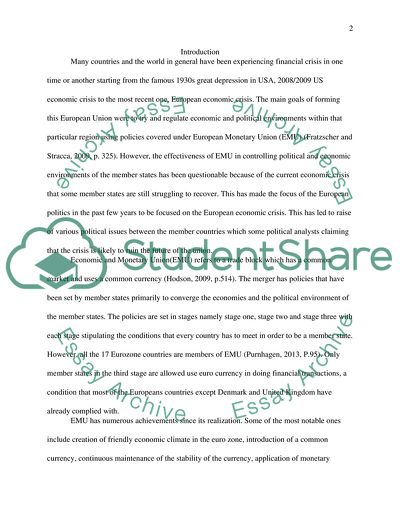Cite this document
(The European Financial Crisis: Economic and Political Environments Essay Example | Topics and Well Written Essays - 2500 words, n.d.)
The European Financial Crisis: Economic and Political Environments Essay Example | Topics and Well Written Essays - 2500 words. https://studentshare.org/history/1815860-politics-of-the-european-union-title-to-what-extent-has-the-financial-crisis-challenged-the-notion-that-economic-and-monetary-union-has-been-a-success-in-economic-and-political-terms
The European Financial Crisis: Economic and Political Environments Essay Example | Topics and Well Written Essays - 2500 words. https://studentshare.org/history/1815860-politics-of-the-european-union-title-to-what-extent-has-the-financial-crisis-challenged-the-notion-that-economic-and-monetary-union-has-been-a-success-in-economic-and-political-terms
(The European Financial Crisis: Economic and Political Environments Essay Example | Topics and Well Written Essays - 2500 Words)
The European Financial Crisis: Economic and Political Environments Essay Example | Topics and Well Written Essays - 2500 Words. https://studentshare.org/history/1815860-politics-of-the-european-union-title-to-what-extent-has-the-financial-crisis-challenged-the-notion-that-economic-and-monetary-union-has-been-a-success-in-economic-and-political-terms.
The European Financial Crisis: Economic and Political Environments Essay Example | Topics and Well Written Essays - 2500 Words. https://studentshare.org/history/1815860-politics-of-the-european-union-title-to-what-extent-has-the-financial-crisis-challenged-the-notion-that-economic-and-monetary-union-has-been-a-success-in-economic-and-political-terms.
“The European Financial Crisis: Economic and Political Environments Essay Example | Topics and Well Written Essays - 2500 Words”. https://studentshare.org/history/1815860-politics-of-the-european-union-title-to-what-extent-has-the-financial-crisis-challenged-the-notion-that-economic-and-monetary-union-has-been-a-success-in-economic-and-political-terms.


